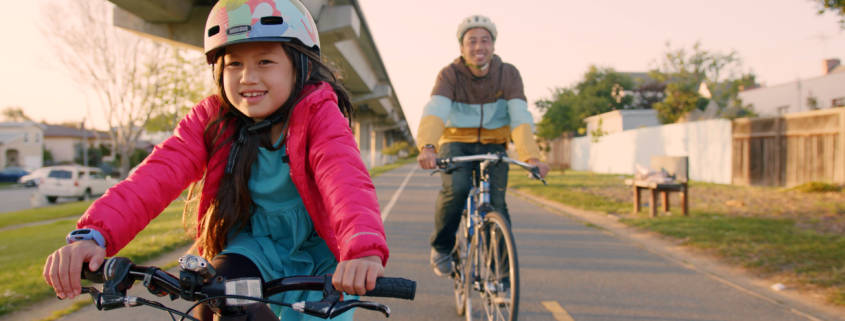Governor Signs Friedman’s Excellent OmniBike Bill, AB 1909
Governor Gavin Newsom has signed Assemblymember Laura Friedman’s excellent OmniBike Bill, AB 1909. The legislature presented Newsom with 16 active transportation bills, and he has, to date, signed seven of them and vetoed only one. CalBike applauds Assemblymember Friedman for her strong support of people on bikes and her leadership on active transportation and community enhancement. And we thank the governor for recognizing the critical role that biking and walking must play in California’s fight to mitigate climate change and make our communities more liveable.
The OmniBike Bill (so-called because it’s an omnibus bill that combines several provisions) makes changes to the vehicle code to recognize that car rules don’t always work for bikes. Modifying the vehicle code to make people on bikes safer affirms that bikes belong on California streets.
Four bike-friendly code changes
The OmniBike Bill makes four changes to the vehicle code. Perhaps the most consequential is requiring drivers to change lanes whenever passing a bicyclist, if feasible. The prior rule, requiring people in cars to give people on bikes a 3-foot margin when passing, was difficult to enforce and not enough space for comfort in some situations. The change lanes to pass provision will make it easier for police to cite drivers who fail to give bikes room for safety.
The bill also stops cities and counties from enforcing bicycle license laws. Most residents aren’t aware of bicycle licensing requirements, and the regulations are rarely enforced. However, some jurisdictions have used them as an excuse to harass youth and BIPOC bike riders. AB 1909 removes another pretext for biased policing.
The OmniBike Bill expands access for people riding e-bikes. In some areas, some or all e-bikes were banned from certain bikeways. The bill requires that e-bikes get access while still allowing the Department of Parks and Recreation to prohibit them on some trails and local authorities to ban them from equestrian, hiking, and recreational trails.
The final provision would allow bikes to cross streets on pedestrian walk signals, rather than only a green traffic light. And, if the governor signs AB 2264, which requires Caltrans walk signals to give pedestrians a 3- to 7-second headstart on crossing the street, people on bikes would get a headstart, too. A study of several intersections in San Francisco showed that adding a headstart reduced right-of-way violations (when a car driver cut off a pedestrian) by 65% to 98%.
The bill will amend the vehicle code to include these provisions by the end of the year, except for bikes advancing on walk signals, which takes effect on January 1, 2024.
The bill section that won’t go into effect
The OmniBike Bill included one excellent provision, tied to CalBike’s Freedom to Walk Bill, AB 2147, that won’t take effect. The Freedom to Walk Bill prevents police from ticketing people for jaywalking when they make a safe midblock crossing but allows tickets for unsafe street crossings. AB 1909 would have removed tickets for pedestrians who safely cross without a walk signal. However, that provision could only take effect if AB 2147 was signed first, and the governor hasn’t taken action on the jaywalking bill yet.
However, that is only a tiny missed opportunity. The OmniBike Bill is a significant victory for people who bike in California, and CalBike is proud to be a strong supporter of this measure.




 Ian Sane
Ian Sane